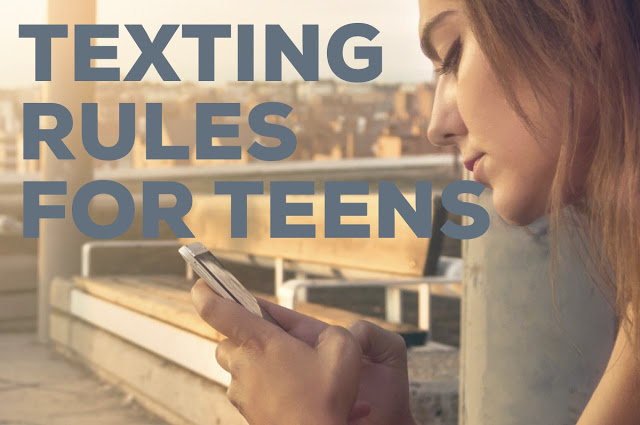This year, my kids have ventured into the world of texting with peers. Their time on the cell phone has increased as they socialize with friends after school via the phone, and group chats abound as well. While I can appreciate their desire to connect with friends, I’ve also observed the danger in these texting relationships. There have already been some hurt feelings, and I see kids sometimes taking the advantage of the detachment of a screen to behave in ways they would never act in real life. I think texting is just like anything our kids learn to do . . . they need guidance at first, and lots of supervision as they learn what is appropriate. Here are some of the rules we’ve come up with in our house.
The privilege of having a cell phone comes with responsibility as well. We have trusted you with this freedom because we think you can handle it, but there is a learning process to texting and we want you to be the best you can be, even on your phone. Here are some rules we would like you to maintain when using your phone to communicate.
Be kind. It can be easy to say unkind things on a phone that you would never say in person. Do not insult, ridicule, mock, or prank your friends via text or facetime.
Be reciprocal. If a friend that you care about texts you, do your best to respond. On the other hand, if someone isn’t texting you back, stop trying to engage. If someone you don’t want to text with is bothering you, ask an adult for help with how to respond in a kind way.
Self-control. If someone hasn’t responded to your text, do not text them again until the next day. If five days have passed with no response, move on to another friend.
Facetime. Text and ask if they want to facetime before you call. If there is no answer, wait until the next day to ask again.
Do not engage in drama. Under no circumstances may you create a group chat where you intentionally leave out another person in order to talk about them. If you have something negative to say about someone else, do it in person. NEVER insult other people via text, even if they are not on the thread, because it can and will get back to them.
Be appropriate. Do not send photos of yourself unless you are fully dressed. (A bathing suit does not count as fully dressed.) Do not ask other people to send you photos of themselves. If they want to do that, they can decide for themselves. If someone sends you a photo that is inappropriate, please ask them to stop and let your parent know. It is illegal for children to send nude photos of themselves and you or your friend could be arrested, so this rule needs to be taken very seriously.
Do not forward chains. Do not send a string of emojis. Use texting to send real and authentic messages to your friends that YOU have composed.
Do not lie. Just don’t do it. Don’t pretend your iphone is newer than it is. Don’t pretend your life is better than it is. Don’t say you are doing something exciting when you aren’t. Don’t pretend you were joking about something you said if you really meant it. Be honest. If you lie, you will be found out, and you will lose credibility with your friends.
Keep it clean. Do not use profanity (don’t cuss.) Do not make inappropriate jokes. Do not send memes or cartoons that are inappropriate.
Be mindful that you are being observed. While you are still young and learning to negotiate the world of texting, your texts will be monitored. They are also being monitored by your friends’ parents. Remember that what you say can be seen by others and you will be helf accountable.
Ask for help. The grown-ups in your life get it! We’ve been texting for a long time, too. We’ve made mistakes, had our feelings hurt, had drama with friends, and have had all kinds of difficult experiences via text. We can help, or just listen, when things aren’t going well.


I so rarely comment, but I feel so much gratitude for this post I had to do it. Thank you – this covers all the bases so well!